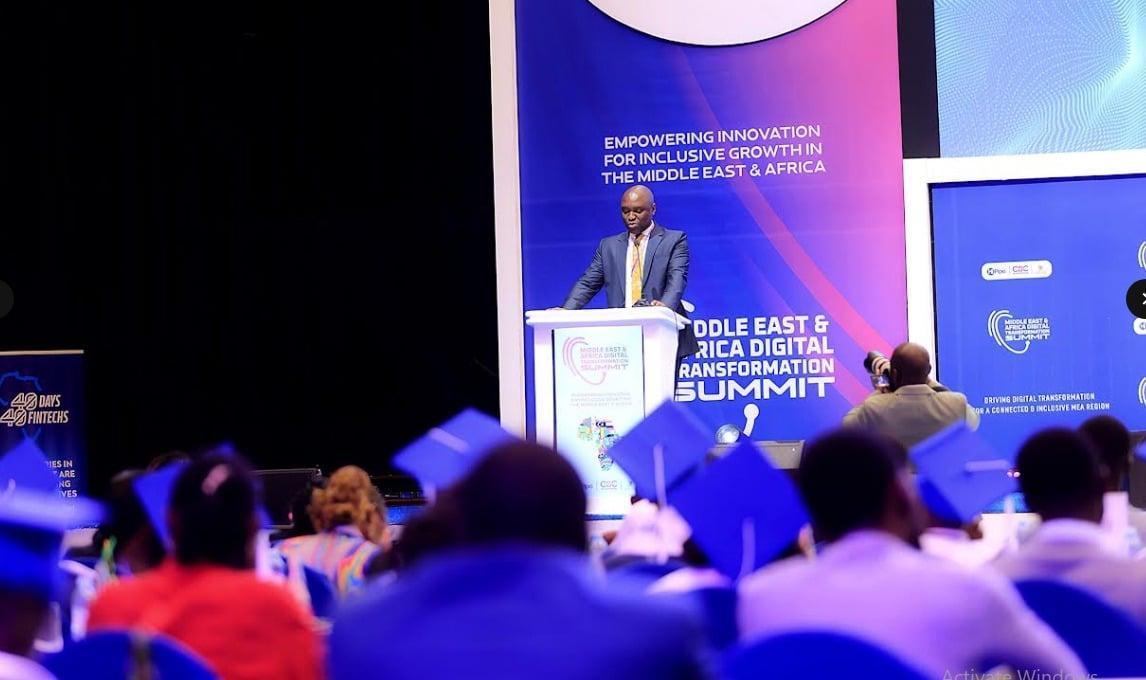Africa-Press – Uganda. Uganda risks being left behind in East Africa’s accelerating digital revolution unless it urgently fast-tracks its digital transformation agenda, experts and industry leaders have warned.
The stark warning was sounded at the Middle East & Africa Digital Transformation Summit held last week in Kampala, where government officials, private sector players, and global tech leaders discussed the continent’s digital future.
The summit’s central message was unambiguous: for Uganda, digital transformation is no longer a matter of choice—it is a national economic imperative.
“We are no longer competing with the village next door, but with economies across the continent and the world,” said Ibrahim Senyonga, General Manager for Enterprise Business at MTN Uganda.
“Technology is the only way to leapfrog legacy challenges and unlock scalable growth.”
Senyonga stressed that Uganda’s Digital Transformation Roadmap, if implemented with urgency and citizen inclusion, could catalyse sustainable development.
But without speed and cohesion, he warned, the country risks becoming a digital outlier.
Uganda’s current digital indicators paint a mixed picture. Internet penetration stood at approximately 30 percent in 2023, according to the Uganda Communications Commission (UCC), while smartphone usage hovered below 25 percent.
Rural communities remain largely excluded from meaningful digital access, limiting participation in e-commerce, e-health, e-learning, and financial technologies.
In comparison, Kenya enjoys over 54 percent internet penetration, underpinned by a strong mobile money ecosystem and widespread e-commerce, according to DataReportal’s Kenya Digital 2023 report.
Rwanda, with 48 percent, has benefited from deliberate government investment in digital identity systems, e-governance, and broadband connectivity in schools, as highlighted by the Smart Africa Alliance and the World Bank.
Tanzania trails close behind at 43 percent, with notable expansion of its National ICT Backbone and fintech regulation, according to the Tanzania Communications Regulatory Authority (TCRA).
“Connectivity is no longer a finish line—it’s merely the runway,” Senyonga said. “If we don’t act now, Uganda risks becoming a digital backwater in a region that is sprinting ahead.”
To help close the gap, MTN Uganda has committed substantial investment in digital infrastructure. Between 2020 and 2025, the company has earmarked resources for broadband expansion, 5.5G trials, fibre optic rollout, and enterprise cloud services.
In June 2024, MTN launched East Africa’s first 5.5G showcase, demonstrating ultra-fast, low-latency connectivity for critical sectors such as health, education, agriculture, and manufacturing.
Beyond infrastructure, MTN is also deploying rural connectivity programmes, device-financing models, and youth innovation hubs.
Its MTN Foundation supports digital literacy campaigns targeting underserved and remote communities.
“Our network is becoming a canvas for local ingenuity,” Senyonga said. “We are not just enabling services—we are co-creating solutions.”
This commitment to innovation was on full display during the Africa Youth Innovation Challenge, held on the sidelines of the summit.
Young entrepreneurs from across the continent showcased agri-tech, health-tech, and fintech solutions, many built atop MTN’s digital platforms.
The event underscored the link between access and innovation—where inclusion thrives, so does problem-solving.
However, experts agreed that even the most committed private sector players cannot achieve transformation alone.
Government leadership is crucial in setting the digital agenda. Panellists at the summit called for coordinated policies to lower the cost of smartphones and data, streamline spectrum allocation, strengthen data protection laws, expand electricity access, and reform education to prioritise technology skills.
“Building the digital state requires spectrum policy, data protection laws, and last-mile infrastructure—none of which any single actor controls,” Senyonga said.
“Uganda’s digital decade is already under construction, and MTN is on-site for the long haul.”
The challenge, he added, is not whether Uganda can transform, but whether it will act in time to avoid falling behind its neighbours.
Uganda’s window of opportunity is narrowing, but still open. With coordinated policy, urgent implementation, and inclusive practices, the country can harness digital transformation to fuel equitable growth, enhance public services, and create a thriving innovation ecosystem.
But without bold and immediate action, Uganda risks losing out on the promise of a digital future—and the economic and social dividends that come with it.
For More News And Analysis About Uganda Follow Africa-Press






